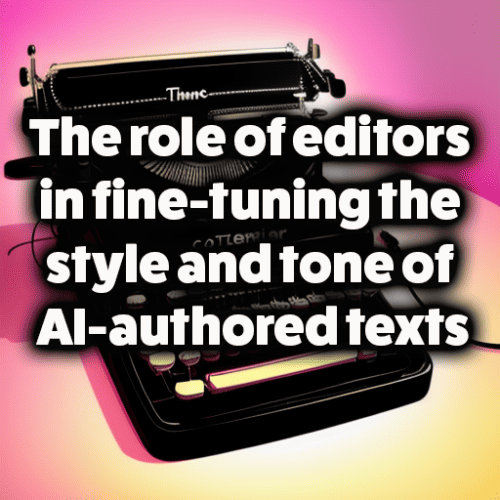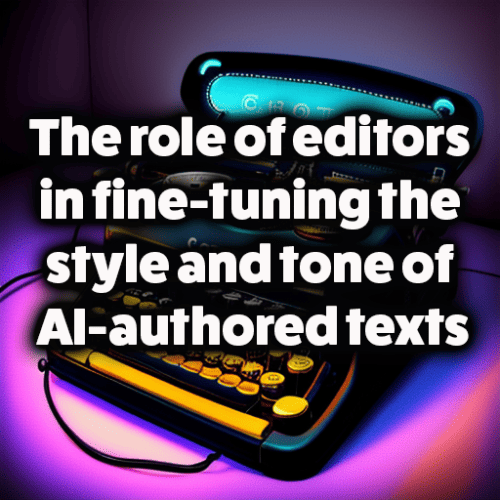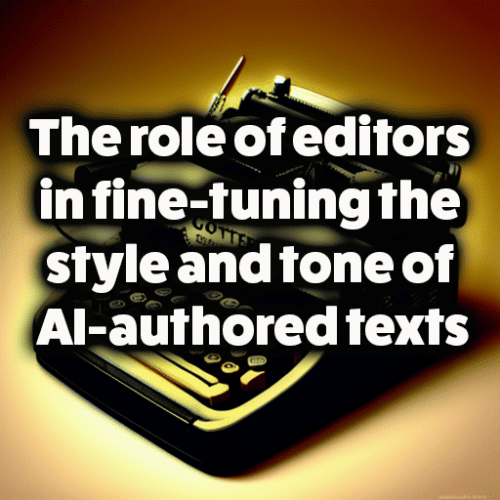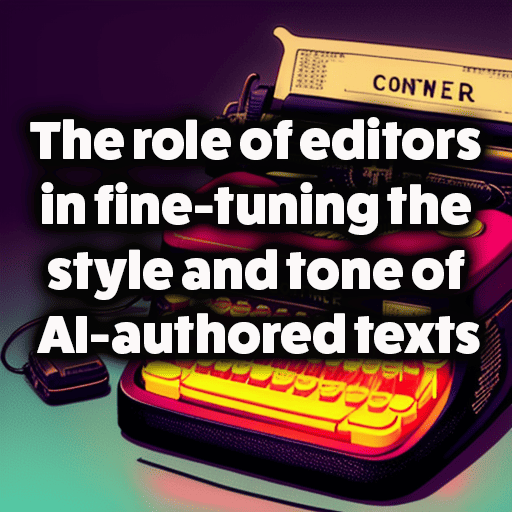The role of editors in fine-tuning the style and tone of AI-authored texts
The role of editors in fine-tuning the style and tone of AI-authored texts. In the brave new world of AI, the landscape of content creation is transforming at a dizzying pace. AI algorithms, like GPT-4 by OpenAI, are weaving words together in ways we’ve never seen before, producing texts with remarkable coherence and flair. Yet, no matter how advanced these AI systems become, the importance of style and tone in written communication remains paramount, and this is where the role of editors becomes critical.
Key Takeaway Table
| Section | Key Takeaways |
|---|---|
| AI in Content Creation | AI’s role in content creation has evolved rapidly, but it still lacks a human touch. |
| The Art of Editing | Editing is crucial to refine content for clarity, flow, and appropriateness. |
| AI and Human Editing | AI-authored text benefits significantly from human editing to ensure style and tone. |
| Challenges in Editing | AI-authored texts often present unique challenges like tone shifts and style inconsistencies. |
| The Future of AI & Editing | AI advancements will redefine, not eliminate, the role of editors. |
| Real-world Implications | AI and human editing present opportunities across various industries. |
II. The Evolution of AI in Content Creation
A. Brief History and Advancement of AI in Content Creation
AI in content creation isn’t a novel concept, but its evolution has been meteoric. From the rudimentary algorithms of ELIZA in the 1960s to today’s sophisticated language models like GPT-4, AI’s ability to generate content has seen massive strides.
B. Current Applications of AI in Generating Text
Today, AI has carved out a space for itself across multiple platforms, from writing product descriptions, blog posts, news articles, and even generating poetry. However, the machine-authored content, while impressive, still lacks the human touch in terms of style and tone.

C. The Strengths and Limitations of AI in Writing
AI can generate content at an astonishing speed and scale. It’s free from the constraints of fatigue, writer’s block, and subjectivity. However, it’s precisely this lack of subjectivity, the absence of personal experience, and emotional understanding that can sometimes result in texts that feel soulless or are tonally off-target.
III. The Art and Science of Editing
A. Explanation of the Editing Process
Editing is an art as much as it is a science. It involves fine-tuning content for clarity, flow, consistency, and accuracy, ensuring the text is not just error-free but also communicates effectively with the intended audience.
B. Different Types of Editing
The types of editing range from developmental editing, which shapes the structure and narrative flow, to copy editing and proofreading that involve finessing language and correcting errors.
C. How an Editor Influences the Style and Tone of a Text
Editors bring a human touch to a text. They ensure that the style and tone align with the target audience’s expectations and the content’s purpose. They can transform a generic piece into something that resonates deeply, elicits emotions, or provokes thought.
IV. The Intersection of AI and Human Editing
A. Why AI-authored Text Needs Human Editing
AI, for all its computational prowess, cannot fully comprehend the nuances of human language and emotions. It lacks an understanding of context and cultural subtleties that shape human communication. Hence, the need for a human editor to refine AI-authored texts.
B. The Complementary Relationship between AI Writing and Human Editing
AI and human editors have a symbiotic relationship. AI provides the raw material – text that is grammatically correct and logically structured. The human editor then molds this text, imbuing it with personality, appropriateness, and a genuine human voice.

V. Role of Editors in Fine-Tuning AI-Authored Texts
A. How Editors Decipher and Enhance AI-Generated Content
Editors decipher AI-generated content by scrutinizing the text’s style, tone, and context. They ask pertinent questions: Does the tone match the subject matter? Is the style consistent throughout? They then make necessary revisions to ensure the text speaks to the reader effectively.
B. The Application of Human Intuition and Experience in Refining AI Content
Editors employ their intuition and experience, honed over years, to make judgement calls that AI, at least for now, can’t. For instance, a news article about a tragic event requires a sensitive and empathetic tone – something an AI might struggle to achieve consistently.
C. Case Studies: Examples of Edited AI-authored Texts
Let’s consider a case study from The Guardian, where GPT-3 wrote an op-ed. Editors played a significant role in shaping the final piece, arranging the AI-generated paragraphs, and creating a meaningful narrative. This exemplifies the crucial role of editors in sculpting AI-generated content.
VI. Unique Challenges in Editing AI-Authored Texts
A. Common Issues and Inconsistencies Found in AI-authored Texts
AI-authored texts can exhibit peculiar issues such as abrupt shifts in tone, inconsistencies in style, or a lack of logical progression. Editors need to be vigilant to spot and rectify these.
B. The Paradox of Creativity and Formality in AI Writing
AI often struggles to strike the right balance between creativity and formality. Editors play a vital role in maintaining this balance, ensuring the text is engaging yet professional.
C. Strategies for Overcoming These Challenges
Editors can overcome these challenges by understanding the strengths and weaknesses of the specific AI writing tool and adapting their editing strategies accordingly.
VII. The Future of Editing and AI-Authored Content
A. Predicted Advancements in AI Text Generation
As AI continues to advance, we can expect it to generate increasingly coherent and contextually accurate texts. However, it’s unlikely that AI will fully replace human writers or editors – it may just redefine their roles.

B. How These Advancements Might Affect the Role of Editors
With more sophisticated AI, the role of editors may evolve to be more strategic – focusing on fine-tuning tone, aligning style with brand voice, and ensuring cultural and contextual appropriateness.
C. The Evolving Symbiosis Between AI and Human Editors
The future of AI and editing is not a zero-sum game. Instead, it’s a promising partnership where AI and human editors work together, blending the best of machine efficiency and human intuition.
VIII. Real-world Implications and Opportunities
A. The Role of AI and Editing in Various Industries
From journalism to content marketing, AI and human editing have significant roles to play across industries. AI can drive productivity, while human editing ensures quality and resonance.
B. Job Prospects and Opportunities for Editors in the Age of AI
The emergence of AI doesn’t spell doom for editors. Instead, it opens up exciting opportunities. Editors who can adeptly refine AI-generated texts will be in high demand.
C. How Businesses and Organizations Can Best Leverage the Benefits of AI and Editing
Organizations can harness AI to generate drafts quickly, then employ skilled editors to refine the content.
This synergy can yield high-quality content at scale, thus maximizing efficiency and effectiveness.
IX. Conclusion (The role of editors in fine-tuning the style and tone of AI-authored texts.)
The importance of editors in refining AI-authored texts cannot be overstated. As we embrace the future of AI in content creation, the human touch of an editor becomes all the more valuable. They ensure that the heart and soul of communication – the style, tone, and human connection – remain intact in the text, whether it’s penned by a person or generated by an algorithm.
X. References and Further Reading (The role of editors in fine-tuning the style and tone of AI-authored texts.)
Those interested in diving deeper into this fascinating intersection of AI and editing may find the following resources helpful:
- “Artificial Intelligence Can Now Write Amazing Content: What Does That Mean For Humans?” – Contently
- “Human After All: Crafting The Editor-AI Relationship” – Towards Data Science
Remember, the symbiosis between AI and human editing doesn’t signify the end of human creativity but rather the beginning of an exciting new chapter in the story of content creation.
Top Five Questions & Answers
1. Why is the role of editors crucial in fine-tuning AI-authored texts?
- Editors bring a human touch to AI-authored texts, enhancing style, tone, and cultural appropriateness, which AI, despite its advancement, struggles to fully capture.
2. What challenges do editors face when editing AI-authored texts?
- Editors often grapple with issues like abrupt shifts in tone, inconsistencies in style, lack of emotional understanding, and occasional lack of logical progression in AI-authored texts.
3. How might the advancements in AI affect the role of editors?
- As AI becomes more adept at generating coherent and contextually accurate texts, the role of editors will likely evolve to focus more on strategic aspects like aligning style with brand voice and ensuring cultural and contextual appropriateness.
4. Is the advent of AI in content creation a threat to editors?
- Not necessarily. AI may redefine the roles of editors, making them more strategic and valuable in refining and enhancing AI-generated content.
5. What are the real-world implications of the partnership between AI and human editing?
- The blend of AI’s efficiency and human editors’ expertise can help businesses produce high-quality content at scale, potentially transforming content-related practices across various industries.
